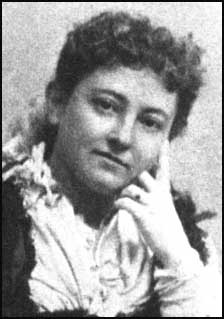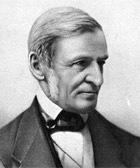The Long View

“And it is not our part here to take thought only for a season, or for a few lives of Men, or for a passing age of the world. We should seek a final end of this menace, even if we do not hope to make one.”
–Gandalf in “The Fellowship of the Ring”
The Flow of Power

“Power! Did you ever hear of men being asked whether other souls should have power or not? It is born in them. You may dam up the fountain of water, and make it a stagnant marsh, or you may let it run free and do its work; but you cannot say whether it shall be there; it is there. And it will act, if not openly for good, then covertly for evil; but it will act.”
–Olive Schreiner (a.k.a. Ralph Iron, South African-born Writer and Feminist, 1855-1920)
Dream, Focus, Act and Simplify

“I learned this, at least by my experiment: that if you advance confidently in the direction of your dreams, and endeavor to live the life which you have imagined, you will meet with a success unexpected in common hours.
You will put some things behind, you will pass an invisible boundary; new, universal and more liberal laws will begin to establish themselves around and within you; or the old laws will be expanded, and interpreted in your favor in a more liberal sense, and you will live with the license of a higher order of beings. In proportion as you simplify your life, the laws of the universe will appear less complex, and solitude will not be solitude, nor poverty, nor weakness.
If you have built castles in the air, your work need not be lost, that is what they should be. Now put foundations under them.”
–Henry David Thoreau (American Essayist and Philosopher, 1817-1862)
Never Really Living

I have often been saddened by people who come to me saying that they have spent years getting ready to do something. It might be to begin a healthy lifestyle, or learning to meditate, but instead of getting on and doing something, they are still busy getting themselves seated.
Often what they need is a gentle – or sometimes not so gentle! – push, and a reminder that even eagles sometimes need to be shoved out of the nest!
It reminds me of this:
“We are always getting ready to live but never living.”
–Ralph Waldo Emerson (American Poet and Essayist, 1803-1882)
Procrastination and Perfectionism
Regular readers will know that I am convinced that we are now in a fourth phase of the personal development movement, in which it is now incumbent on writers and speakers to support their propositions and suggestions with empirical data. And if there is no data, then they need to collect some.
There is an idea that has launched a thousand self-help books, websites and seminars: that perfectionism is the primary cause of procrastination. There was a time when I was the Prince of Procastinators. After my “recovery” I became an expert on helping others overcome the problem. So I’ve done a lot of research on procrastination. As I was preparing this posting I looked at over a dozen books and two dozen websites, and almost every one of them had “perfectionism” as a or the cause of procrastination.
But is it true?
The answer is “No.”
Professor Piers Steel from the University of Calgary Haskayne School of Business has published an important paper in the current issue of the American Psychological Association’s Psychological Bulletin.
The paper confirms some things that we have always suspected, for instance that most people’s New Year’s resolutions are doomed to failure, but demolishes the idea perfectionism is the root of procrastination.
The evidence from this work – which is the fruit of ten years of research – is that procrastinators have less confidence in themselves and a lower expectancy that they can actually complete a task. By contrast, perfectionists procrastinate less, but they worry about it more.
These are the main predictors of procrastination:
- Low levels of self-confidence
- Low expectancy of being able to complete a task
- Being task averse
- Impulsivity
- Distractibility
- Motivation to complete the task
The paper also makes the point that not all delays are procrastination: the key factor is that a person must believe that it would be better to start working on given tasks immediately, but still not start work on it.
It is said that 95% of people procrastinate at some time in their lives and 15-20% are chronic procrastinators.
Amazingly, there is a mathematical formula that predicts procrastination. Steel calls this Temporal Motivational Theory, which takes into account the key factors such as the expectancy a person has of succeeding with a given task (E), the value of completing the task (V), the desirability of the task (Utility), its immediacy or availability (Ã) and the person’s sensitivity to delay (D).
This is the magic formula: Utility = E x V/ (Ã) D
I am impressed by this work, but it is also supremely practical, because it helps point us at appropriate targets to treat our own tendency to procrastinate.
There is also something else that is very important. Many of us believe from our own experience that perfectionism is indeed the root of our own procrastination. For a long time I thought so myself. But research like his helps us to re-analyze our understanding of ourselves. We all begin by using folk psychology to explain our behavior and the behaviors of other people. The trouble is that those explanations are often wrong. Research like this can be enormously helpful as we grow and develop as individuals.
It remains unclear why some people may be more prone to procrastination, but some evidence suggests it may be genetic. It may also be more common in people with anxiety disorders or attention deficit disorder.
You may also be interested to evaluate your own tendency to procrastinate. There is a terrific resource here.
“If we wait for the moment when everything, absolutely everything is ready, we shall never begin.”
–Ivan Sergeyevich Turgenev (Russian Writer, 1818-1883)
“The wise does at once what the fool does at last.”
–Baltasar Gracián (Spanish Jesuit Philosopher and Writer, 1601-1658)
“Procrastination is opportunity’s assassin.”
–Victor Kiam (American Businessman and Former CEO of Remington, 1926-2001)
“I have spent my days stringing and unstringing my instrument, while the song I came to sing remains unsung.”
— Rabindranath Tagore
(Indian Poet, Playwright, Essayist, Painter and, in 1913, Winner of the Nobel Prize for Literature, 1861-1941)
The Parachute Approach to Evidence
Almost three years ago, one of the British Medical Journal – one of the top rated medical journals in the world – published an amusing article with an extremely serious sting in the tail. The article, entitled “Parachute use to prevent death and major trauma due to gravitational challenge,” highlighted some of the absurdity surrounding the constant demand for scientific validation using only one set of criteria.
The authors pointed out that – as with many interventions intended to prevent ill health – there had been no randomized controlled trials of parachutes in preventing the major trauma that may be caused by gravity!! Yet we would hope that nobody would consider exiting a plane in flight without first equipping himself or herself with a parachute.
Advocates of evidence-based medicine have criticized the adoption of interventions that have only been evaluated by using observational data.
The authors therefore said that, “We think that everyone might benefit if the most radical protagonists of evidence based medicine organized and participated in a double blind, randomized, placebo controlled, crossover trial of the parachute.”
They used the lack of randomized controlled trials in testing parachutes to show that situations still exist where such trials are not only unnecessary, but also dangerous.
Anyone who has spent 30 seconds on this blog knows that I’m firmly committed to the rational analysis of data. But I am just as certain that there are many valid types of evidence.
There is an important article in this week’s issue of the British Medical Journal that lies at the heart of Integrated Medicine, and the research that we’ve been facilitating. The article suggests that waiting for the results of randomized trials of public health interventions can cost hundreds of lives, especially in poor countries with great need and potential to benefit. If the science is good, we should act before the trials are done.
The article argues that the “parachute approach,” where practice and policies are based on good science but without randomized trials, is often more suitable in resource poor settings. They go on to consider three areas of critical importance, in which there are real ethical, moral and logistical problems if we wait for the results of randomized controlled trials.
They use the three examples of:
- Oral rehydration therapy
- Male circumcision to prevent HIV infection
- Misoprostol for postpartum hemorrhage
We have constantly run into the same kinds of problems with alternative, complementary and now Integrated Medicine. In most of theses fields there is precious little in the way of randomized controlled trials, but a wealth of clinical reports and case series. The problem with unorthodox medicine is that much of it does not fulfill one of the criteria for the parachute approach: to be “based on good science.” This is one of the reasons for expending so much energy on finding common ground between conventional and Integrated Medicine, and for investigating several advances in the basic sciences that may help us square the circle.
It is also why we have adopted a second criterion: the potential for a therapy to do harm. Clearly the level of evidence for risk and benefit is quite different for a potentially risky surgical procedure, compared with, say, crystal therapy. The biggest risk with crystal therapy is that it might get used inappropriately in place of a treatment that has been shown to work.
But above all else, when we are dealing with sick and suffering people, we have to take action. Safe action, action that has a good chance of helping, and action that is fully explained to the individual. Honestly and straightforwardly, and without false optimism.
“A man’s best friends are his ten fingers.”–Robert Collier (American Writer and Publisher, 1885-1950)
Manifesting and Prayer
“All will happen as you want it, provided you really want it.”
–Sri Nisargadatta Maharaj (Indian Spiritual Teacher and Exponent of Jnana Yoga and Advaita Doctrine, 1897-1981)
“The spirit is life. The mind is the builder. The physical realm is the result.”
–Edgar Cayce (American Healer, Mystic and Psychic, 1877-1945)
In Healing, Meaning and Purpose, we discuss manifesting: the art of flowing with the Universe to achieve your perfect outcomes. We talked about the limiting beliefs that can prevent us from fulfilling our potential. Do not try and put limits on the help that may come to you. Too often people tell me that they are not seeing any meaningful coincidences or that their prayers are not being answered. The problem is usually that they have decided on the form in which the sign will appear, or of the way in which help will arrive, instead of having an open mind, and remembering that “God works in mysterious ways.”
I have the privilege of delivering hundred of speeches, lectures and workshops each year, but earlier today I was in the unusual position of being in the audience for a really great speech. I was reminded of an old story that appears in Chapter 11 of my forthcoming book Sacred Cycles:
A priest is stranded in his house as the waters of a nearby river are rising rapidly. He can still see out of his first floor window when a rescue boat rows up to his house.
“Get in says the rescuer.”
“No” says the priest, “I’m praying and waiting for God to save me.”
As the floodwaters rise, he moves to the second floor, when he hears the sound of a motorboat containing two rescuers.
“Get in, they say, it is getting worse.”
“No” says the priest, “I’m praying and waiting for God to save me.”
Finally the waters have driven him onto the roof of his house when he sees a helicopter hovering above him.
“Let us winch you to safety,” says the winch man.
“No” says the priest, “I’m praying and waiting for God to save me.”
Finally the helicopter is forced to leave and sadly the priest perishes.
When he arrives in the next world he is angry with God, and says,
“Why didn’t you save me? I prayed with all my might!”
To which he hears this response: “Three times I tried to save you: I sent a rowboat, a motorboat and a helicopter, and you rejected all the help that I sent to you.”
Please do not ever make that mistake. I have had more than one person feel guilty about seeing a physician and taking medications, feeling that they should have been healed by faith alone. Then they have realized that their prayers may indeed have been answered by the provision of medications and a person with the skills to use them.
Before asking for Divine assistance, ask yourself what you can do to help yourself and others: rather than trying to command God and the Universe to do your bidding, try reporting for duty!
“God manifests himself in what is hidden.”
–Thomas Merton (French-born American Trappist Monk and Writer, 1915-1968)
Technorati tags: Manifesting Prayer Synchronicity Sri Nisargadatta Maharaj Edgar Cayce Expectation Belief Thomas Merton
Chess and the Mind
I have a confession to make: I have been a life long chess enthusiast, and I can’t start the day without visiting the best chess website on the internet. We are currently almost half way through the second major tournament of the year: the same one at which the incomparable Garry Kasparov announced his retirement last year.
Chess is not just a pastime. There is evidence that it is one of the ways in which we can improve the thinking abilities of young people and prevent the downward slide of our minds as we get older.
In the United Kingdom, studies have shown an astonishing correlation between the academic attainments of schools and the success of their chess teams. Year after year, the schools with the most successful teams send more of their students to top universities, compared with schools that do not play the game or have weak teams. During the Second World War many of the geniuses working at Bletchley Park who cracked the Enigma Code, were outstanding chess players.
For a long time now big business has been recruiting high-level chess players into particular positions that require their unusual skills. It tells you something when you see a major corporation placing advertisements for executives in chess magazines. Chess helps develop memory, concentration, visualization, decision-making, and sharpens our analytical and strategic thinking. It can even help make us more creative and more imaginative. Tournament players have to have a good degree of self-knowledge, and some grasp of psychology is a must. I have won more than one tournament game because of my ability to read the body language and intentions of an opponent. It is no surprise that a good many strong chess players are doing extremely well playing online poker. Chess really is a microcosm of life in general.
“Life is like a game of chess: we draw up a plan; this plan, however, is conditional on what – in chess, our opponent – in life, our fate – will choose to do.” –Arthur Schopenhauer (German Philosopher, 1788-1860)
The chess master Bruce Pandolfini was portrayed – and had a brief cameo – in the film Searching for Bobby Fischer. He has written a nice little book called Every Move Must Have a Purpose, about applying chess strategies in business and life, and next month will see the eagerly awaited publication of a similar book by the master himself, Garry Kasparov.
Here are some principles that I have learned from chess, and that I apply to health, life and business:
- When confronted with any kind of a problem, try to break it down into small manageable chunks, and if you can’t, learn to use and to trust your intuition. (Have a look at my post on Unconscious Processing and Intuition)
- Constantly ask questions: Why is this happening? Is there a pattern here? What does the other person intend? How can I fashion a response that fits and will move things in the direction that I want and is congruent with my overall plan of life? What are the rules here? Can I break the rules? This does not mean cheating, it means being sure that you are not applying rules mechanically, without checking to make sure that they apply in your particular situation.
- Always work to a clear plan. Even if the plan is not correct, it will always be better than the efforts of someone who has no plan at all. It is fine to “go with the flow,” after you have won the game!
- Be constantly on the lookout for opportunities and if there aren’t any, create them!
- As in life, chess demands action. You will succeed at nothing by sitting and waiting for success to come to you.
-
A game of chess, like the game of life demands one move after another. The successful person is one who makes each move to the very best of their ability. As Willard J. Marriott said: “It’s the little things that make the big things possible. Only close attention to the fine details of any operation makes the operation first class.”
-
Have absolute integrity in everything that you do. Be honest with other people and be honest with yourself. If you say that you are going to do something, do it. If you commit to a plan, do not stop until it is complete.
- Coordinate all of your resources. In chess, it is impossible to win unless all the pieces are coordinated. You can destroy everything that you’ve worked for by having a piece adrift on the far side of the board, with nothing to do.
- If you have any weakness, make it your business to convert them into strengths.
- Don’t exceed your own capacity by over-extending yourself.
- Resilience is an extremely important attribute that we all need to develop: things do not always go according to plan, and when they do not, it is important to be able to bounce back quickly.
- Learn not to be over-awed by challenges. Many people defeat themselves with faulty expectations. I once had a trainer who was an extremely fine player. In one tournament he was in with a chance of winning serious money, but in the last round he was drawn against a Russian grandmaster. I saw him before the game: shoulders hunched over, hyperventilating and a scowl on his face. Play began with a variation that my coach and I had analyzed five days earlier, and he had shown me what not to play. In the game against the Russian he played the very move that he had just told me was a critical mistake! He lost in just a few moves. Not because the Russian beat him, but because he beat himself.
“A mountain is composed of tiny grains of earth. The ocean is made up of tiny drops of water. Even so, life is but an endless series of little details, actions, speeches, and thoughts. And the consequences whether good or bad of even the least of them are far-reaching.” — Sri Swami Sivananda (Indian Physician and Spiritual Teacher, 1887-1963)
Technorati tags: chess, life lessons, mind
Rooting Out Resistance to Change
It is never easy to change our mind about anything, as long as we remain attached to a particular belief, outcome or line of reasoning. Subsequently, we can become inflexible and intolerant of new ideas. There are several barries to emotional, personal and spiritual freedom and ATTACHMENT is one of the most potent.
In my recently released book, Healing, Meaning & Purpose: The magical power of the emerging laws of life, I discuss 12 major reasons why people resist change. They are:
- Being unaware that change is possible.
- Having entrenched belief systems.
- Having an emotional or habitual attachment to a particular way of doing things.
- Feeling comfortable about where you are.
- Fearing change or the consequences of change, like losing face or risking embarrassment or ridicule.
- Having intellectual reasons for maintaining the status quo.
- Being unaware of information to support the need for change.
- Being unconvinced by the necessity for change.
- Having blockages or perturbations in their energy fields.
- Having a life story that does not leave room for change or evolution.
- Being unaware of the rewards that flow from changing.
- Not knowing how to harness resources to accomplish change.
What are your roadblocks to emotional, personal and spiritual freedom? What is the first step in creating positive changes in your life?
Technorati tags: spiritual growth








